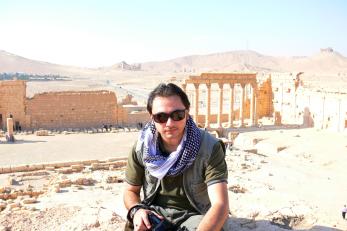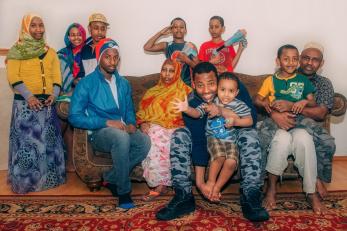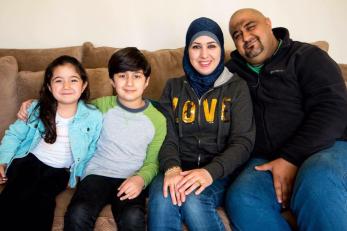Refugees share their stories of loss, hope and survival
The life of a refugee starts with a single question: Should I stay or should I go?
For Emad, that question was answered when a bullet narrowly missed the side of his mother’s head.
It was August 2013, just outside Damascus, Syria. For months, Emad endured the constant checkpoints that forced him to carry an ID just to go to the grocery store, and the bombs that went off in his town.
Then bullets started hitting his building. On the third night in a row, and after seeing his mother nearly killed in front of him, Emad fled.
He took his mom, his sister, her husband and her children. He took two suitcases and a backpack. His laptop. A camera.
“I had no clue where I was going,” Emad said. “All I needed to know was that I had to leave the borders.”
Emad is just one of the millions around the world who have been forced from their homes by war and disaster. According to the United Nations refugee agency, UNHCR, nearly 65.3 million people are displaced globally, seeking refuge somewhere inside their home country or in a different country completely. And more leave every day.
In these challenging places, Mercy Corps works to build peace, strengthen communities and prepare displaced families to return to their homes when it is safe to do so.
Where refugees live around the world and what we're doing to help ▸
What can get lost in the magnitude of this crisis are the real, human stories of loss, fear, hope and survival that every refugee carries with them, wherever they go.
In support of World Refugee Day June 20, we sought out people who have made that journey and can recall the experience of having to leave home, possibly forever. (Note: Mercy Corps does not offer resettlement services.) These are their stories:
Emad from Syria

Emad spent a year in Lebanon before work brought him to the U.S., where he has applied for asylum. He has been here for more than two years.
He left behind all of his childhood pictures, and all of the books his mother spent a lifetime collecting. His father, several of his siblings and many of his friends are still inside Syria.
“I have lost everything I worked for my entire life,” he said.
At least four of his family members, and several of his friends, have been killed.
His mother and his sister’s family have moved between several Middle Eastern countries since leaving Syria. First, they went to Egypt, until political unrest prompted his mother to join him in Lebanon and his sister’s family to move to Libya.
After Emad left for the U.S., his mother joined his sister in Libya. But more political unrest there forced his mother and sister’s family to relocate to Istanbul, Turkey, where they are now.
Emad can still remember what was going through his mind as he was fleeing Syria.
“Most of the time, I was focused on safety,” he said. “The moment I crossed the [Syrian] borders, I lost all hopes that I will be able to go back in my lifetime.”
Abdullahi from Somalia

Abdullahi, 23, grew up listening to “music.” It’s what he calls the sound of the gunshots that peppered his childhood in Somalia.
Violence was so common that when there was a nearby shooting, he would curiously run toward it to see who died. People solved personal grievances through killing, and not knowing if he would survive the day was a constant reality.
“If we go from home to school, you would not [know] who will come back safely,” he said. “And sometimes we would hear bullets every day. [You] just pray hard so you can make it to the next day.”
When Abdullahi’s father was involved in a car accident and the others involved started targeting the family for money — or worse — they knew they had to get out for good.
His family of 14 fled by van to Kenya, then eventually to a refugee camp in Uganda, where they lived in a two-room, soil-brick hut for the next nine years. Abdullahi was 14.
Life in the camp was lackluster. Abdullahi remembers it as an isolated place, especially for a young person.
The camp had primary school, but after that the options were bleak. Without job or educational opportunities — or any activities to keep them busy — many young people turned to drugs. Few saw a future outside of the camp.
“Some people, because they have been there for their whole life, they don’t have anything else to do,” Abdullahi explained. “They will just stay there.”
Abdullahi was one of the lucky ones. He did well in primary school and was sponsored to further his education at a boarding school in a nearby city.
And when he was 22, after nine years of waiting, his entire family was accepted to be resettled in the United States.
“I was waiting my whole life,” he said of the moment he found out they could leave Uganda and have a chance at the peace and stability they’d longed for.
“Now life seems more easy,” Abdullahi said. “Everyone is going to school. People are happy. They have a job, and now we live in a home. No noises, no more music, you know?”
Ahmed from Iraq

The day after Ahmed narrowly escaped being kidnapped by al-Qaida, he came home to find a message from the group pinned to his front gate: You should disappear.
Ahmed was a journalist in Iraq. Because he worked with large news organizations, the government, and the U.S. Army, he was always in danger.
He and his family moved 12 times in 13 years in search of safety. It wasn’t something that was easy to find: Iraq was a war zone then, and it still is.
Life was difficult for his family, too. Every morning of those 13 years, Ahmed’s wife, Rasha, made sure he kissed her and their two young children goodbye before he left for work. They didn’t know if they would see him again.
Rasha worried constantly. And Ahmed’s children, Mustafah and Almas, couldn’t play outside the gates of their home. It wasn’t safe.
A family visit to the park would take weeks of preparation. Ahmed needed time to find a secure area and design an escape plan should something go wrong.
“The militias always go to the crowded places, because they need to make news,” he said.
The decision to finally leave Iraq was the hardest decision of his life. He loves his country, and he would have to leave behind his home, his belongings, his career, his parents and four brothers.
“It’s tough, it’s tough to be a refugee,” Ahmed said. Being separated from his mother and father, and not knowing if he will see them again, feels like punishment.
“It’s not easy to isolate yourself from your family. But what’s happened to me, I don’t want the same things [to] happen to my kids. I need a better life for my kids.”
Ahmed and his family have lived in the United States for just under two years. He does not know when, or if, he’ll be able to return to Iraq.
Sana from Syria
Sana didn’t flee Syria like so many of her fellow Syrians. She was studying abroad in the United States, keeping tabs on the increasing violence in her home country through news reports and frequent Skype talks with her family, in particular, her father.
Then one morning in June 2013, Sana received a Facebook message from her sister: Their father had been detained, and her mother and sisters were fleeing for Turkey.
“I remember that moment and everything that happened,” she said. “I started crying. I went into isolation for four days in my room … I felt so much guilt … I should have been there with them.”
Sana’s mother and sisters made it to Turkey. One sister, a journalist, was able to move on to Germany with a work visa. Her mother and other sister, 16, are still in Turkey. Her mother’s health is not well. Her younger sister has been out of school for two years.
Sana stayed in the United States and was granted asylum. She has not heard from her father since 2013.
The loss and trauma has given her a purpose. She is graduating later this year with a degree in political science and plans to move to Europe to work with refugees.
“After experiencing all this, I’m interested in investing myself in this career and helping people in the best ways,” she said.
And once it becomes safe again, she wants to return to Syria and help rebuild her country.
“I miss the people of Syria,” she said. “It’s not about the place anymore. It’s about the people. Many have been killed, have fled, have been scattered all around. I miss having a normal daily life.”
Rukia from Somalia
When Rukia was 6, her mother sold everything the family owned to get her and her 10 children out of Somalia. Rukia’s father, who was being persecuted for money, had already fled at her mother’s urging.
“My mom realized we were either going to be killed or die there of hunger. We couldn’t survive in Somalia,” Rukia said.
The journey was a difficult one. Rukia recalls a week-long trek through the bush, on foot, battling sickness and wild animals. Her mother and oldest siblings carried the younger children most of the way, though all the kids were under 10.
Eventually, the family made it to Hagadera refugee camp in Kenya. “That’s where we began our life. Our normal life,” she said. Her father found them there two years later.
It was not an easy existence.
The 12 of them shared a one-room tent. Money and food were scarce. Rukia remembers wearing the same clothing for months or years at a time, carrying her schoolbooks in a plastic bag, and splitting a single pencil into four pieces to share among her siblings.
Plus, it wasn’t safe, and they lived in fear every day.
“Life was really hard. It was difficult,” Rukia said. “Our parents did their best to get a job, feed the family, take care of everything, but there was nothing out there.”
But the hardest part of being a refugee, she said, is not having a place to call home.
“Refugee camps are terrible places. Some of them will become permanent places for people who have no hope. Some of them who have hope will be able to go back to their country, there will be peace,” she said. “But [many of] these people have no place.”
“[You feel like] you’ve been thrown away. You don’t have a place to call home, and you don’t know when you will be killed next. You don’t know what will happen to you. Every morning you [wake up] in fear and shock.”
When Rukia was 17, after growing up in Hagadera refugee camp, she and her family were resettled in the United States.
Patrick from Democratic Republic of Congo
Ask Patrick who he left behind in Congo, and his answer is somber: All of them.
It was 2008, and he was coming of age in an environment mired by conflict. Congo is plagued by ethnically fueled violence, and at 16 — fighting age — Patrick was fated to be recruited by his own tribe or killed by one of the others.
“It was both death. To me there was no life,” he said. “That’s why I decided to go away.”
He left his home, his family and his country, alone, with only the clothes he was wearing. He didn’t look back.
“It’s hard to tell somebody your feelings, about how I felt,” he said. He struggles to find the words to describe how painful that decision was. “It was like a death. I was close to death.”
“I didn’t know where I was going. I didn’t know what is in the future. I didn’t know if I’m going to live or die. I just decided to go.”
And his strategy was simple: Get as far away from Congo as possible.
He traveled on foot to Uganda, where he lived on the streets and in the bush until a family friend helped him get to Kenya. There he was taken in and given the opportunity to finish school.
His family eventually fled as well, seeking refuge in Rwanda. Their home, businesses and the life they built in Congo have been destroyed.
“To lose a country, to lose your right in your country … it’s the most painful thing in my life,” Patrick said.
Now 25 and resettled in the U.S., Patrick is doing his best to overcome his wounds. He has experienced tremendous violence, death and loss in his short life. But he tries not to focus on that.
“I am not somebody who [is] driven by the past. I tried to overcome the past by myself, by creating a new hope,” he said. “Now here I am. I started life and I can see [a] future now.”
Special thanks to Catholic Charities of Oregon for facilitating many of these interviews.